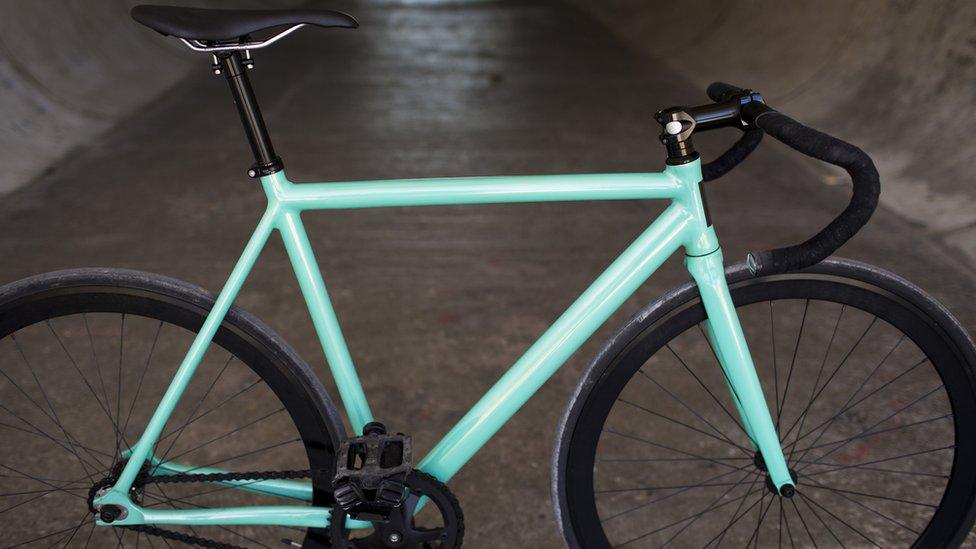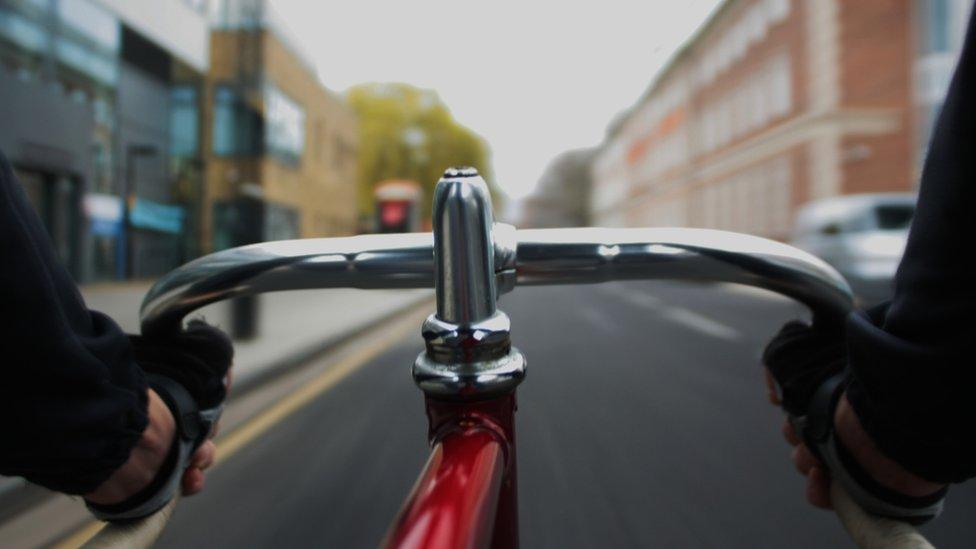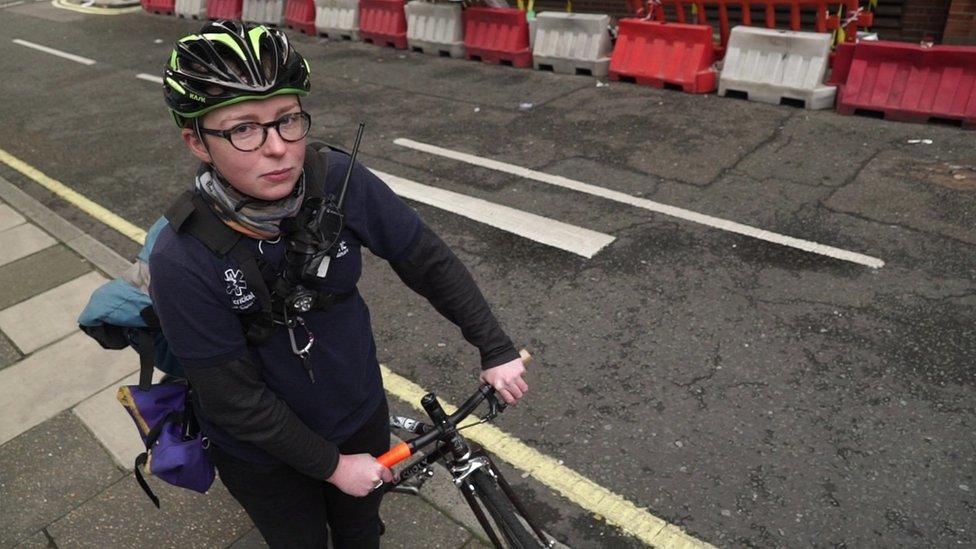'Why I ride a bike without a brake'
- Published

Fixed-wheel bikes are similar to the track bikes seen in velodromes, being raced at great speeds
As a widower urges "reckless" cyclists to learn from the death of his wife, who was knocked down and killed by a teenager on bike with no front brake in east London, a courier explains to the BBC's Laura Lea what made him ride a "fixie" - and why this may now change.
Michael - not his real name - has worked as a bike courier for the last year and a half and believes the case - which led to an Old Bailey trial and national media attention - has "whipped up hatred against cyclists".
"I've heard other couriers saying to me they feel on edge and that pedestrians have looked at them differently," he says.
"In the last couple of weeks, with every courier I've met, this has been the first thing we've talked about," the 27-year-old adds.
He spends 9-10 hours a day delivering packages on the roads of central London and is paid on a job-by-job basis, so weaving in and out of traffic to complete the work quickly is vital.
'Sensation of control'
Michael rides a fixie - a fixed-wheel bicycle - with no front brake. This is illegal.
By law, a bike on a public road in the UK must have two brakes.
A fixed-wheel bicycle has a single gear and no freewheel mechanism. The rear fixed wheel of a fixie - which a rider can slow using the pedals - counts as a brake.
"I didn't actually know it was against the law until this case," he says.
"It takes a long time to get used to riding a bike without brakes," Michael says.
"People do it because it's this personal sensation of control with the bike. You never get that quick in London, it's more about how you cycle. I think most couriers who spend hours riding every day have the credentials."
He does admit you "can probably slow down quicker with a front brake".
"I wouldn't advise it for an 18-year-old kid who's been watching cycling videos," he adds.
The trial of Charlie Allison over the death of Kim Briggs heard how the then teenager had compared the experience of riding without a front brake to videos by a stunt cyclist.
'Most trained urban cyclists'
Mrs Briggs's husband, Matthew, asked why those who rode bikes without a front brake would take that "risk with somebody else's life".
But Michael does not believe he is taking a risk: "I wouldn't ride it if I felt there was a risk to others."
He does concede that it makes riding "exciting" and "fun" but says his fellow couriers are among the most trained urban cyclists in London.

Following the case, Michael is planning to get a brake fitted. But this isn't for the reason you might think.
"I'm worried going out on my bike, that the police are going to take my bike off me and then I won't be able to work," he says.
Mr Briggs said he hoped courier companies would communicate clearly and forcefully that bikes without two brakes are not legal.
Michael said this could have little effect as "so many [cycle] couriers are self-employed".
Cycling organisations and charities have widely supported Mr Briggs. Duncan Dollimore, from Cycling UK, called riding without a front brake on a busy road "stupid".
Josh Lane - a mechanic at Look Mum, No Hands, a cafe and workshop for cyclists in central London - told BBC Radio 4's Today programme many fixie riders "just think about their own safety" rather than anyone else.
He said: "The problem is you have younger guys that see these riders and think 'Damn , that is so cool. That's how I want to look'. Take their brakes off and maybe they can't stop or move in the way that these really professional riders can."
He said: "In this particular circumstance… someone has crashed into someone - that could have been avoided if they had brakes. You've got to take that into account. You've got to think of other people, not just yourself."
Mr Lane, who rides a fixie himself with a front brake, suggested that bikes should have to be regularly serviced and checked, much like the MOT system for cars.
He said: "People need to be intelligent enough to look at these videos, take away certain aspects of them but then maybe take a look at how they ride a bike, where they ride a bike and what the consequences can be."
But Michael believes there has been too much "fixation" on the issue of the brakes.
"It would be an entirely different story here if [Alliston] fell away from Mrs Briggs into an oncoming bus. This was a freak accident.
"People just step out in front and expect us to stop. There needs more education for pedestrians dealing with cyclists. The law needs to look at better cycling infrastructure."
He did agree, however, that "pedestrians have the right of way, even if they are wrong".
Crash investigators who studied CCTV of the incident concluded Alliston would have been able to stop and avoid the collision if the bike had been fitted with a front brake.
Alliston is due to be sentenced on 18 September.
- Published24 August 2017

- Published7 January 2017
